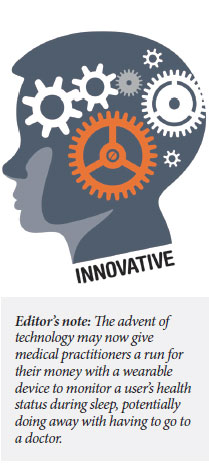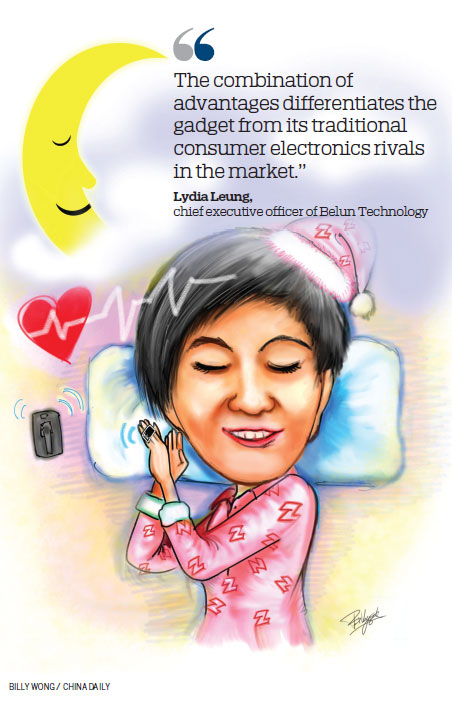A cutting-edge ring just for a clean bill of health
Updated: 2019-02-15 07:54
By Dai Kaiyi in Hong Kong(HK Edition)
|
|||||||||
When you find you've difficulty falling asleep at night, refrain from rushing into any costly body check-up in hospital - a simple ring may offer you some valuable clues shortly.
A hectic lifestyle, high stress and long working hours have made people living in modern societies fall victim to all sorts of illnesses and diseases, resulting in the surge of an array of health technology entrepreneurs.
Hopping onto the bandwagon have been Lydia Leung and her "dream team" who have designed a ring that can check everything relating to the quality of your sleep.
The source of most diseases in modern metropolises - respiratory and cardiovascular-related diseases like high blood pressure, stroke and diabetes - comes from sleep health, which is closely related to BMI (body mass index), a weight-to-height ratio, according to Leung, chief executive officer of Belun Technology, which was formed by a group of experienced researchers who have been working on adapting self-developed patent technologies into home use medical devices.

Founded in 2016, the Hong Kong-based tech startup is dedicated to developing reliable medical devices and solutions allowing people to monitor and manage their health at home.
The startup's current flagship gadget - Belun Ring - is a medical grade wearable device to be put on your index finger while sleeping to monitor health data ranging from heart rate and its variation, blood oxygen saturation and motion.
The gadget does analysis with a cloud-based AI algorithm that works out the potential risk of illnesses such as obstructive sleep apnea, and could even construct the relationship between the user's daytime activities and sleep quality.
Having been awarded the Asia Pacific Information and Communication Technology Alliance Award, and the Red Dot Design Award (Germany) in 2018, Belun Ring is unlike many other sleep technology gadgets in the market. Armed with a US Food and Drug Administration clearance, it has been certified as a Class Two grade medical device.
Besides, the back-end cloud that the company developed with artificial intelligence, assuring an above 90-percent accuracy in health data collected from users, guarantees the report generated by the gadget could be utilized directly for physicians' further analysis.
"There're quite a few companies out there that cover both hardware, software, as well as artificial intelligence," said Leung, noting that the combination of advantages differentiates the gadget from its traditional consumer electronics rivals in the market.
A graduate with a PhD degree in electrical and electronics engineering from the Hong Kong University of Science and Technology, Leung had never envisioned herself at the helm of a tech startup.
"I had never dreamed of starting my own business," said the entrepreneur, who decided to stay on as a director in the Opto-Electronic Technology Division at Hong Kong Applied Science and Technology Research Institute Company - an applied research institute - and established and spearheaded the development of the medical and healthcare electronics team for 11 years.
It wasn't until a few years ago when the whole startup business atmosphere flared up under the auspices of the Hong Kong SAR Government did Leung decide to "ride on the wave to start the business".
For sure, it wasn't easy for the HKUST graduate with mere R&D expertise to start all from scratch, albeit her 11 years' experience in the industry.
It was hard to get investors to understand the technology side of things in the first place, not to mention securing their funds for a long-term operation, explained the R&D veteran.
Nevertheless, her decade-long exposure to the industry did offer her a promising recipe for success.
Having worked at an institute that serves as a bridge between fundamental research and how the technology can be applied by the general public on a daily basis, Leung had massive opportunities to keep contact with doctors and patients in hospitals and centers for the elderly - keeping her fingers on the pulse of not only the market's demand and supply, but the whole ecosystem with almost every party involved.
The exposure equipped her with the knowledge of the stakeholders' needs, as well as legal procedures such as how to file a patent for products, which, to some extent, have made her an all-round industry expert.
The current business model for Belun Technology is mainly business-to-business (B2B), with most of its gadgets sold to clinics or health centers in Hong Kong, which means potential gadget users need to go to offline healthcare sites before they could lease one home to check their sleep qualities.
The next step, according to Leung, is to expand Belun's coverage and dipping their toes on the business-to-customer (B2C) model, with a brand new product that would connect the AI-powered back-end cloud to users' mobile phones and translate the results into straightforward conclusions or instructions for users.
kevindai@chinadailyhk.com

(HK Edition 02/15/2019 page8)